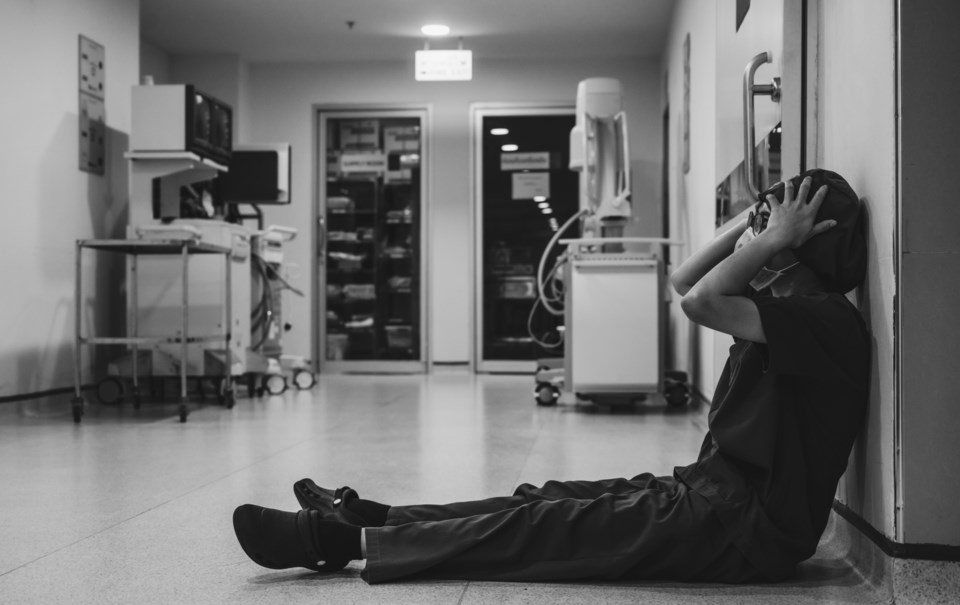“Health-care in a crisis” is a headline that has been shoved down our throats a lot in recent weeks, like this is somehow a surprise development and not something we’ve been warned about for years.
It’s also not a shock that some conservative provincial governments, like Doug Ford’s sideshow government in Ontario, are using the current crisis to push for a mixed private/public health-care system that could eventually spell the end of our public system in the name of slightly greater convenience for our wealthiest citizens.
The writing has been on the wall since 1946 when the baby boom kicked off in earnest. Canada has about eight million baby boomers, plus about two million others from previous generations, representing about one in four Canadians that need a higher level of medical care than the average.
This problem has been building a long time, both from a demographic perspective as well as in terms of our growing population. The inevitable problem accelerated as COVID burnout took its toll on doctors and nurses. There are also a lot of systematic issues that boiled over—like low fees for service that make it almost impossible for family doctors to keep practices open.
Canada needs more doctors, nurses and other medical professionals. We need more money in the system to pay for them. We need more buildings for them to work in, and more community practices that are open to accepting new clients. We especially need to spread these medical professionals over a wider area, serving more rural and remote areas.
It seems impossible to fix, but it can be done if Canadians can get on the same page for once. The answer is never privatization, it’s to properly support the universal public system we’ve taken for granted.
For example, it’s clear that the boomer generation has not contributed enough in taxes to fund its health-care needs. Canada’s national debt—after fighting the Second World War—was a few tens of billions. Today it’s $1.2 trillion, which makes the boomers the largest beneficiaries of decades of low taxes and high government spending.
With boomers retiring, there’s no income to tax, but there are other options for this generation to partly fund its own health-care. For example, the boomer generation has also been the largest beneficiary of a Canadian-dream-crushing increase in real-estate values, and many of them are sitting on a huge amount of wealth that is, with some creativity, taxable. Wealth taxes, empty-home taxes and inheritance taxes can help fund health-care for this group—all of which can be implemented with sunset clauses once that demographic bubble has passed.
As for the multi-billion-dollar shortfall for our health-care needs—money to train and hire doctors and nurses, an increase in service fees that lets family doctors stay in business, funding for programs to recertify doctors with foreign qualifications, and retention bonuses for health-care workers to stick around a little longer—we’re all going to have to pay a little more.
Call it a “One Canada” plan—a one-per-cent increase in corporate taxes, income taxes, the GST and capital gains taxes. I know people don’t want to pay another cent right now, but having a little less money is infinitely preferable to what we would have to pay out of pocket for private health-care. If it makes it easier to swallow, we can add a sunset clause of 10 years to gauge whether the situation has improved.
There’s also a lot of waste in health-care. Personally, I’ve been on the same asthma inhaler for 18 years, but I still need to see a doctor once a year to get a prescription, taking time away from another patient. One in 10 Canadians has asthma, most of which have it under control, which adds up to millions of unnecessary appointments every year. There are lots of other examples where a pharmacist, nurse practitioner or even the patient can be trusted without involving overworked professionals.
We also need to get serious about preventative health-care while we work the problem and train the people we need.
For example, a national pharmacare program will ensure people can afford their medications and won’t require hospitalization for under-medicating.
A safe drug narcotic supply would also prevent overdoses. Vancouver Coastal Health alone treated more than 11,000 people for overdoses in 2021, mostly related to tainted drugs. That’s a huge burden on the system.
We also need to tax sugar and to further increase taxes on alcohol and cigarettes. We need to reduce the number of traffic accidents (100K+ a year) by slowing people down and mandating helmets on roadways for everyone on skateboards, bikes and scooters, electric or otherwise. We need to encourage fitness and recreation—every schoolyard should have a running track with lights and a basketball court, and every city and town should have bike lanes. We have to encourage companies to let employees work from home so they have more time to focus on their health. We also have to mask up and sanitize in cold and flu season.
Whistlerites could also dial things back for a little while. While it’s good we’re all healthy and active, we also contribute a lot of preventable injuries to the system. Fun’s fun, but now is probably not the best time to push our limits and take those risks that land us in the hospital a couple of times a year.




